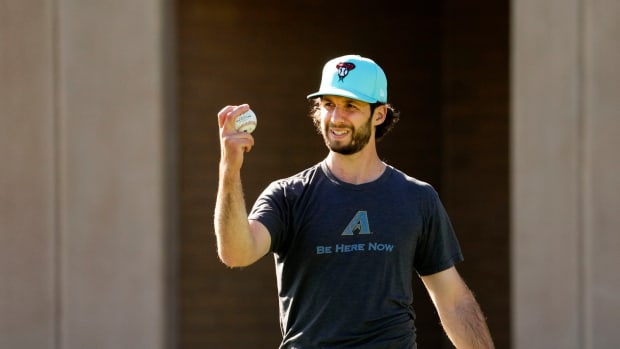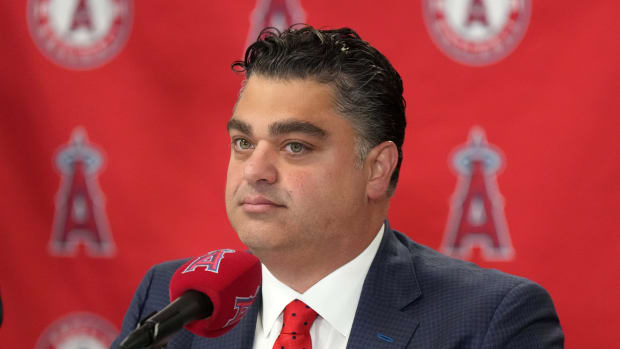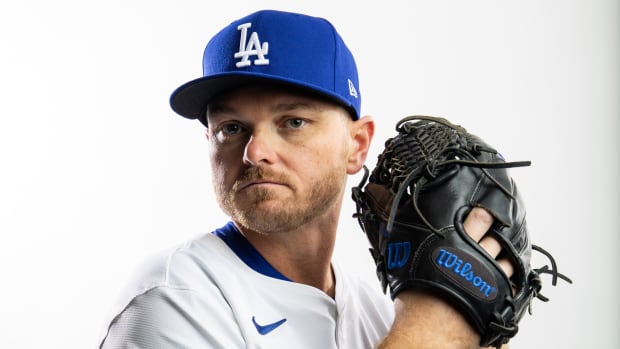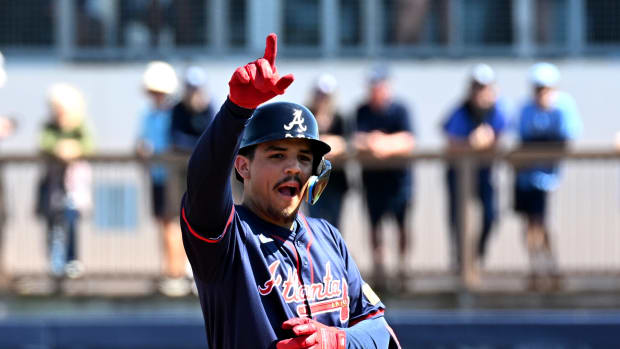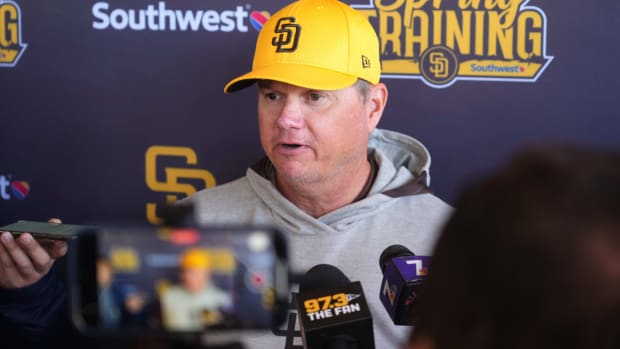Forecasting the 2019-2023 Baseball Hall of Fame Inductees
The 2018 Hall of Fame election is in the books, and a quartet of honorees — Vladimir Guerrero, Trevor Hoffman, Chipper Jones and Jim Thome — is Cooperstown bound, to be inducted on July 29. On the heels of an election where voters used a modern record of 8.46 slots per ballot and gave at least 50% of the vote to a record-tying nine players, Hall-heads such as myself are already looking to next year and beyond. So for the fifth year in a row, I've fought off my fatigue to gaze into the crystal ball, revisiting my outlook for the next five elections.
Admittedly, this is an exercise requiring some amount of imagination and speculation, though it is grounded in my research into the candidates and the history and mechanics of the voting. Underlying it is my own spreadsheet simulation, in which I've apportioned a similar share of the vote across the top candidates from year to year while expecting candidates to follow certain trajectories, some of them rather well-worn by similar candidates. As any given year's incorrect assumptions—such as my own on John Smoltz or Ivan Rodriguez taking multiple years to get elected—wind up creating a ripple effect, it's back to the drawing board each time.
By way of example, consider how my view of the 2018 election and its aforementioned quartet of honorees has evolved over the years. In 2014, just a year removed from the BBWAA's first shutout since 1996, I predicted that Jones and 11th-year candidate Tim Raines would be elected in 2018, but later that summer, the Hall announced that the eligibility window of Raines and all other candidates with fewer than 10 years on the ballot to that point would be truncated from 15 years to 10. At that point, I envisioned Thome being elected in 2019, the final year of my forecast, with Guerrero in the 45-55% range, Hoffman in the 30% range, and 11 players elected over the five year span; instead, with voters breaking the slots-per-ballot record three times, we got 16, the largest five-year surge in Hall history. In 2015, my forecast for 2018 yielded Jones and Thome, along with a prediction that Raines would fall off in 2017, and that Guerrero and Hoffman could possibly pull above 60% by 2020, setting themselves up for 2021. Circa 2016, I expected Hoffman to go in alongside Jones and Thome, with Raines elected in 2017 and Guerrero in 2020. Last year, I finally got it right, naming the aforementioned fab four; it was the first time I got the next year's entire slate right since my 2015 forecast for Ken Griffey Jr. and Mike Piazza in '16.
So yes, you might not want to take the baby's college fund to your nearest bookie with regards to my predictions for 2023, but here's my latest read of the future nonetheless. For the sake of this exercise, I am assuming that the Hall will keep the 10 votes per ballot system in place, with a 5% minimum to avoid falling off and 10 years of eligibility for new candidates. Note that each ballot's year refers to the year of induction; that ballot is released in November of the previous year, with a voting deadline of December 31. To be eligible, a candidate must not have played in the majors for five full seasons, but his eligibility year will actually be six years after his last appearance.
2019
Top newcomers: Mariano Rivera, Roy Halladay, Todd Helton, Lance Berkman, Andy Pettitte, Roy Oswalt
Top holdovers: Edgar Martinez, Mike Mussina, Roger Clemens, Barry Bonds, Curt Schilling
Most likely to be elected: Rivera, Halladay, Martinez
Falling off: Fred McGriff
Having received 70.4% in this year's election, Martinez is well positioned for 2019, his final year of eligibility. Stop me if you've heard this one, but 19 out of the 20 candidates to receive at least 70% and return to the ballot the following year (instead of aging off) were elected, with Jim Bunning the exception (twice). This will complete a remarkable comeback for Martinez, who in 2015 received just 27.0% and then had his remaining eligibility cut from nine years to four.
Where Hoffman, the former all-time saves leader, took three ballots to gain enshrinement, Rivera, who broke his record, will have no trouble gaining first-ballot entry. Between that record, his incredible postseason performance (0.70 ERA in 141 innings) while helping the Yankees win five championships, his substantial edge on every other reliever besides Dennis Eckersley in WAR, JAWS and WPA, and his status as one of the game's beloved ambassadors, a share in the 95% range seems quite likely. The Hall's decision to overrule the BBWAA's previous vote to publish every ballot almost certainly rules out his becoming the first unanimous pick in history.
A year ago, I believed that Halladay would be elected in 2022, but in my view, his tragic death in November has accelerated his timeline to the point that he'll leapfrog the holdover starting pitchers. With "only" 203 wins and 2,117 strikeouts and no World Series experience, his resumé may look short next to those of Schilling and Mussina, but his two Cy Young awards and two no-hitters (one a perfect game and the other in the postseason) give him advantages over the pair, as does his 131 ERA+. He tops the average enshrined starter's seven-year WAR peak, and while he's a bit short on the career and JAWS fronts, ranking 42nd overall, the dearth of strong pitching candidates following in his wake could make his credentials stand out even more even without the added emotions involved.
I don't expect the same for Pettitte despite his 256 wins and five rings. While his 117 ERA+ is in the vicinity of Hall of Famers Bert Blyeven, Steve Carlton, Fergie Jenkins, Gaylord Perry and Phil Niekro, he lacked their staying power, finishing with at least 1,000—and sometimes 2,000—fewer innings than that group. Nor does he have their Cy Youngs or their JAWS standing (he ranks 88th), and of course, he was named in the Mitchell Report for using HGH. I'd expect a share in the 25-30% range, keeping him in the discussion, which is more than can be said for Oswalt, whose 163-102 record and 3.36 ERA (127 ERA+) in 2,241 innings position him as a Johan Santana-like candidate, albeit without the multiple Cy Youngs; Santana fell off after receiving just 2.4% this year. Helton, whose peak is above the first base standard and who's within one point of the JAWS standard, will have his adherents, but between his mid-career falloff and the voters' resistance to the far more well-rounded Larry Walker and to Coors-inflated stats in general, he's got an uphill battle. Berkman, with a 144 OPS+ but the number 20 JAWS ranking among leftfielders and just 1,905 career hits, will fall victim to the Rule of 2,000; no post-1960 expansion era player with fewer has been elected yet.
As for the rest of the candidates, Mussina—who has gained 38.9% over the past three cycles to climb to 63.5% this year—should finish within striking distance of a bronze plaque for 2020. Bonds and Clemens, who only gained about three points this year in the face of vice chairman Joe Morgan's letter, will regain a bit of momentum, riding the overwhelming support of first-time voters (23 out of 26 who have supported the former over the past two years, 24 of 26 for the latter) amid a shrinking electorate into the low 60s. Schilling will climb into the mid-50s if he can avoid further alienating Hall voters during the other 2018 election cycle, the political one. Walker and Omar Vizquel could climb into the 40% range, with the former building on this year's big gain (12.2 points, to 34.1%) and the latter from a solid debut at 37.0%. McGriff could get a final ballot push, but it's doubtful he'll top 30% given a previous high of 23.9% set in 2012.
2020
Top newcomers: Derek Jeter, Bobby Abreu, Jason Giambi, Paul Konerko, Adam Dunn, Cliff Lee
Top holdovers: Mussina, Bonds, Clemens, Schilling, Walker, Vizquel
Most likely to be elected: Jeter, Mussina
Falling off: Walker
With his 3,465 hits (sixth all-time), 14 All-Star appearances and five championship rings, Jeter isn't just a lock for Cooperstown, he's got a very strong chance at a top 10 share of the vote—upwards of 97.2%—even with his defensive shortcomings. Whatever chance he had at unanimity is gone thanks not only to the Hall's decision but to the rocky early going in his tenure as the part-owner of the Marlins, where it appears he's been less than forthcoming about the depth of his payroll cuts.
Jeter is almost certainly alone among this year's first-ballot set. Neither Konerko's 439 career homers nor his respectable .279/.354/.486/118 OPS+ lifetime batting line and upstanding reputation will keep him on the ballot any longer than Carlos Delgado (473 homers, .280/.383/.546/138 OPS+ line, but just 3.8% in 2015). Likewise for Dunn and his 462 bombs, particularly given the way his career slid into replacement level territory once he joined Konerko on the South Side. Giambi, with his 440 homers and a 139 OPS+, was a better hitter and far more valuable player than either Konerko or Dunn (46.3 JAWS, compared to 24.5 for Konkero and 17.2 for Dunn), but he's still short of the first base bar by a wide margin. His prominent position in the BALCO mess won't help him either, as his candidacy more closely resembles Gary Sheffield's than Bonds'. Abreu, despite a stellar .291/.395/.475/128 OPS+ batting line and a career/peak/JAWS that's a whisker above Guerrero across the board, won't have nearly the same impact on the ballot. Lee, with just 143 career wins and the 124th-highest JAWS among starting pitchers, will go the way of Santana and Oswalt.
This is Mussina's opening, as the separation between him and Schilling continues to widen; the latter could be in the 60-65% range, along with Bonds and Clemens. Walker will approach 50% in his final cycle, and carry some momentum into an appearance on the 2022 Today's Game Era Committee ballot. Vizquel could be around 45-50% by this point, and with the competition for ballot space dying down, any of a number of candidates could have upward momentum, including fifth-year candidate Billy Wagner, third-year candidates Scott Rolen and Andruw Jones, second-year candidate Helton, and longer-lingering holdovers such as Jeff Kent (seventh year), Sheffield (sixth year), or Manny Ramirez (fourth year), warts and all.
2021
Top newcomers: Tim Hudson, Torii Hunter, Aramis Ramirez, Dan Haren, Mark Buehrle
Top holdovers: Bonds, Clemens, Schilling, Vizquel
Most likely to be elected: Schilling
Falling off: none
The first year that I'll have a ballot will be the weakest one for newcomers since 2012, as none is anywhere close to the JAWS standard at his position or has a notable milestone that will fuel his candidacy; note that there won't be a single candidate in his 10th year, as nobody from 2012 even made it onto the 2014 ballot.
Hudson won 222 games and finished with a 120 ERA+, but he ranks just 82nd in JAWS, far below every other starter up for discussion in this exercise except Pettitte. Buehrle (214 wins, 116 ERA+) ranks 90th, one notch below Pettitte, while Haren is more than 100 notches below that (though if Schilling's Twitter feed can hinder his candidacy, maybe Haren's can help his). Hunter has 2,452 hits, 353 homers and nine Gold Gloves, but he's 32nd among centerfielders in JAWS, nowhere near as good as the Kenny Lofton/Andruw Jones/Jim Edmonds cluster from 9th to 15th—and two of those three were done in by the Five Percent Rule. Ramirez had some thump (386 homers and a .492 slugging percentage) but is 85 runs below average via the defensive metrics, leaving him just 59th in JAWS among third basemen.
All of which suggests that this will be a year for holdovers such as Kent, Sheffield, Rolen and Jones to step forward, though the top ones by this point are likely to be the controversial trio, Bonds, Clemens and Schilling. A year ago, I had this year as the Gruesome Twosome's opening, with Schilling a year behind, but—spoiler alert—this time I'm reversing that. Cooperstown better root hard for somebody to break through on the Era Committee ballots, specifically the Golden Days (Dick Allen?) and Early Baseball ones, to draw a larger crowd to induction day.
2022
Top newcomers: Alex Rodriguez, David Ortiz, Jimmy Rollins Mark Teixeira, Prince Fielder, Jonathan Papelbon, Joe Nathan
Top holdovers: Bonds, Clemens, Vizquel, Rolen, Helton, Kent, Sheffield
Most likely to be elected: Bonds, Clemens
Falling off: Sosa
This, the 10th year of their candidacy, is where Bonds and Clemens will finally gain entry. Again, in January 2018, on the heels of smaller gains than in the previous two years, their chances may not look great, but to get to 75% in four years, Bonds needs to gain a modest 4.7% per year, and Clemens 4.4%. Their anointment doesn't mean that the voters will suddenly give the twice-suspended Ramirez or the once-suspended Rodriguez a free pass, however, to say nothing of Sosa, who will age off the ballot here if he hasn't already slipped below 5%.
Ortiz is a different story. The key to Big Papi's candidacy is his 541 career home runs and great postseason numbers (.289/404/.543 with 17 homers) while serving as the centerpiece of the Red Sox's three championships from 2004-2013. He'll have to overcome a more minor PED connection, as he was reported as having failed the supposedly anonymous 2003 survey test (as were Ramirez and Rodriguez), but in late 2016, when Ortiz was near the end of his career, commissioner Rob Manfred basically disavowed the veracity of that test on the grounds that there were at least 10 false positives among the 104 reported positives; the discrepancies were never ironed out because the threshold to trigger mandatory testing had been met. Ortiz will also have to overcome the stigma of spending 88% of his career at designated hitter, though just as his retirement tour gave Martinez (who outscores him by a wide margin in JAWS while spending just 72% of his career at DH) a significant boost towards election, Martinez's 2019 election will help to justify that of Ortiz, though not necessarily on the first ballot. I foresee a strong debut, perhaps in the 60-65% range. Rodriguez might get half that, better than Ramirez his first time around, but hardly enough to suggest inevitable election
Beyond Ortiz and Rodriguez, it's difficult to see any of the other newcomers making a dent. Rollins will have his adherents, but he made only three All-Star appearances and ranks just 32nd at the position in JAWS, ahead of only two Hall of Famers, Phil Rizzuto and Rabbit Maranville (not to mention Vizquel). Neither Teixeira nor Fielder even reached 2,000 hits. Nathan is slightly ahead of Hoffman and Wagner in JAWS, Papelbon slightly behind, but neither can match the pair for save totals or the latter for dominance, and both have a paucity of innings (923 1/3 for Nathan, 725 for Papelbon, compared to 903 for Wagner and 1089 1/3 for Hoffman).
The modest crop will leave a lot of room for holdovers, though we shouldn't expect the fervor that has greeted ballots over the past five years, during which voters have included at least 7.95 names per ballot, breaking the modern record three times. Still, Vizquel could be well over 50% by this point, even with a whole lot of analytically-minded voters less than convinced of his merits. On the flip side, analytical favorites such as Rolen and Helton could pick up steam, perhaps in the 40% range. Or maybe it's Sheffield or Kent benefiting from the absence of players with impressive career totals. I'll freely admit that at this point, I'm throwing darts.
2023
Top newcomers: Carlos Beltran, Ichiro Suzuki, Chase Utley, Bartolo Colon, Francisco Rodriguez
Top holdovers: Vizquel, Rolen, Helton, Sheffield
Most likely to be elected: Ortiz, Beltran, Suzuki
Falling off: Kent
This ballot will include players who hung up their spikes following the 2017 season, but of the ones listed above, only Beltran has officially retired. With nine All-Star appearances, three Gold Gloves, 2,725 hits, 435 homers, outstanding postseason numbers (.307/.412/.609 with 16 homers) and the number eight ranking in JAWS, he should break through where Lofton, Edmonds, Jones and Hunter have come up short. His October prowess will make for a fitting Cooperstown companionship with Ortiz, particularly given the 10th anniversary of the pair’s World Series matchup.
Unlike Beltran, the 44-year-old Ichiro is still searching for a major league job, but given his replacement level showing in 2017, and a meager net 5.0 WAR over the past seven seasons, his time may be up. With 3,080 stateside hits, 10 All-Star appearances, 10 Gold Gloves, and his MVP and Rookie of the Year awards, not to mention his status as one of the most beloved players in recent history, and a tremendous international ambassador for the sport, he's a first-ballot lock no matter when he becomes eligible.
Utley hasn't retired yet either, and has gracefully accepted a diminished, elder statesman role. He's 10th in JAWS at the position thanks to the tremendous impact of his fielding and baserunning, but appears to be two seasons away from reaching 2,000 hits (he has 1,850, including just 73 in 2017), which means rough sledding ahead. Colon, coming off an ugly 6.48 ERA and heading into his age-45 season, is beloved throughout the game, but with 240 wins and 4.04 ERA (107 ERA+), he's basically Jamie Moyer (2.4% in 2017) plus a Cy Young, a PED suspension and an outstanding collection of GIFs. Rodriguez, with 437 career saves, was torched for a 7.82 ERA in 2017; while he's shown resilience during his career, he's the opposite of beloved given his off-field issues, and unlikely to surpass Wagner, Nathan and Papelbon in the voting.
The presence or absence of those candidates will have only so much impact on the holdovers, but it's too soon to say whether any of them will be within striking distance by 2023. I don't see Kent, who's maxed out at 16.7% in his first five years, gaining enough ground to reach 75%, but 40-50% isn’t unrealistic, positioning him a solid Today's Game candidate.
I wish I knew where the candidacies of Rolen, Helton, Jones, Sheffield, Wagner and Vizquel were going, but five years requires more crystal ball polish than is currently on the shelf at my local hardware store. What I do know is that with 11 candidates projected for election over this span, we'll see a lower concentration than in these five historic years, while still leaving room for a surprise or two. I can't wait to see how it plays out.






























